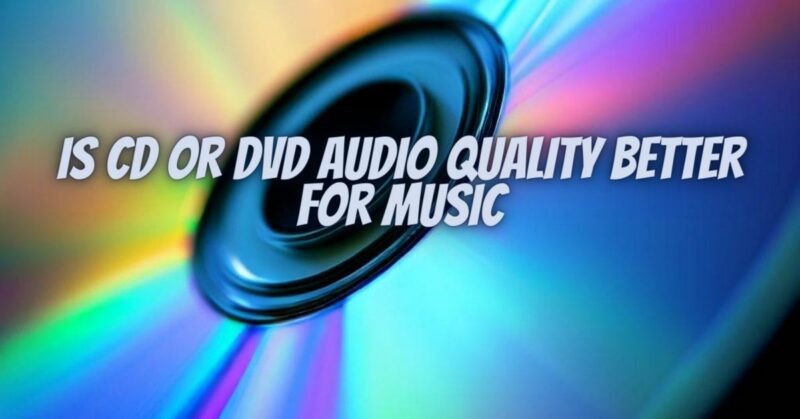The pursuit of high-quality audio reproduction has been a constant endeavor for audiophiles and music enthusiasts alike. In this comprehensive article, we will delve into the world of audio quality by comparing two popular physical media formats: CDs (Compact Discs) and DVD Audio (Digital Versatile Disc Audio). We will explore the specifications, differences, and nuances of sound quality that define these formats, helping you make an informed choice for your musical preferences.
CD Audio: The Gold Standard
Compact Discs, introduced in the early 1980s, set the gold standard for digital audio playback. Here are the key features and sound quality aspects of CD audio:
- Bit Depth and Sampling Rate: CDs offer a bit depth of 16 bits and a sampling rate of 44.1 kHz. This format provides a dynamic range and frequency response that can faithfully reproduce the majority of music genres.
- Lossless Compression: CD audio uses lossless compression, meaning that the audio quality is preserved without any data loss during compression or decompression. This results in a faithful reproduction of the original recording.
- Audio Capacity: A standard audio CD can hold up to 74 minutes of audio content, offering a substantial listening experience but sometimes requiring album tracks to be edited to fit within this time frame.
- Audio Formats: CDs primarily use the PCM (Pulse Code Modulation) format, a common standard for digital audio. It does not support additional audio channels or surround sound formats, focusing on stereo playback.
DVD Audio: Elevating the Listening Experience
Digital Versatile Disc Audio, or DVD Audio, emerged in the late 1990s as a format designed to enhance the audio experience. Here’s what you need to know about DVD Audio:
- Bit Depth and Sampling Rate: DVD Audio can offer higher bit depths (typically 24 bits) and higher sampling rates (typically 96 kHz or 192 kHz) than CDs. This higher resolution can provide a more detailed and nuanced sound quality.
- Lossless Compression: Like CDs, DVD Audio also employs lossless compression techniques, preserving the audio fidelity and ensuring that no data is lost during playback.
- Audio Capacity: The audio capacity of a DVD can vary depending on the chosen audio format and compression. A single-layer DVD can hold up to 4.7 GB of data, allowing for longer playtimes compared to CDs.
- Multichannel Audio: One of the defining features of DVD Audio is its support for multichannel audio. It can provide 5.1 or even 7.1 channel surround sound, creating an immersive listening experience ideal for movies, concerts, and audiovisual content.
- Audio Formats: DVD Audio supports a wide range of audio formats, including PCM, Dolby Digital, DTS (Digital Theater Systems), and more. These formats allow for various audio options, from standard stereo to high-definition surround sound.
Choosing Between CD and DVD Audio
The choice between CD and DVD Audio depends on your specific audio preferences and needs:
- CD Audio: Opt for CDs when you prioritize audio purity and fidelity for music albums. CDs are ideal for audiophiles who value high-quality sound in a traditional stereo format.
- DVD Audio: Choose DVD Audio when you desire versatility and an enhanced audio experience, especially for content that benefits from multichannel surround sound. DVD Audio is suitable for movies, concerts, and multimedia presentations.
It’s important to note that advancements in digital audio technology have introduced even higher-resolution formats like Blu-ray Audio and Super Audio CD (SACD), which offer audiophiles greater audio fidelity. These formats provide higher bit depths and sampling rates than traditional CDs or DVD Audio, catering to those seeking the highest possible sound quality.
Sound quality in music is a multifaceted aspect, and the choice between CD and DVD Audio depends on your specific audio needs and preferences. CDs offer high-quality, lossless audio suitable for music albums, while DVD Audio provides versatility and enhanced audio capabilities, including multichannel surround sound. Your choice should align with your musical preferences, whether you prioritize audio purity or immersive sound experiences. Additionally, consider exploring newer formats if you are seeking the utmost audio fidelity in your listening journey.


